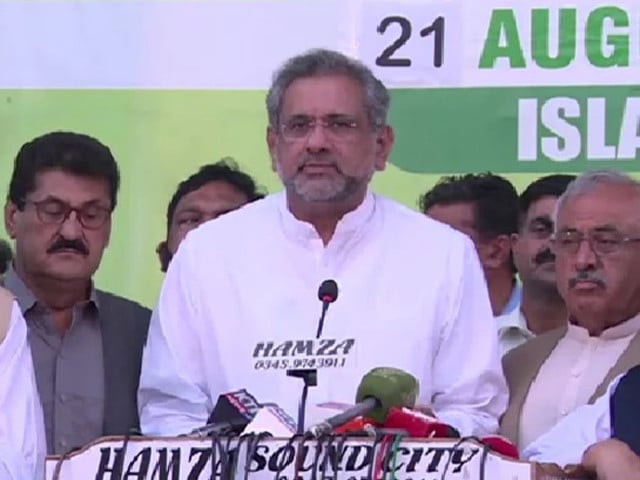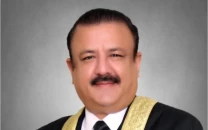Opp says talks with govt conditional to PM’s ‘permission’
Former premier asks whether info minister has PM’s ‘permission’ to say ‘we need to reduce bitterness’

In what appears to be the finest example of mistrust between the treasury and opposition benches, the opposition parties on Friday said that talks with the government will only be held if Prime Minister Imran Khan gives his explicit consent to the negotiating team.
Responding to Federal Minister for Information and Broadcasting Fawad Chaudhry’s tweet, wherein he extended a proverbial hand of friendship to the opposition and offered to start dialogue, former prime minister Shahid Khaqan Abbasi asked whether he had “permission” from the premier for this matter.
“Does he have the permission of his prime minister to say ‘we need to reduce bitterness’,” the ex-PM said while speaking to The Express Tribune.
Keeping in view the political volatility between the government and opposition inside and outside the parliament, the Pakistan Muslim League-Nawaz (PML-N) leader asked if the offer meant that the parliament would “actually” start functioning in the new year.
In 2021, the National Assembly (NA) was marred by quorum syndrome throughout the year as the quorum – requiring presence of 86 members (one-fourth) of the 342-member house for proceedings – was pointed out by the opposition 54 times and it was found to be incomplete 39 times upon counting; suggesting that either the ruling party lacks interest or it has no control over its members.
The information minister’s tweet was also seen as an admission of the continuous bickering between the two sides, which has resulted in lowering prestige of politicians, political instability and parliament’s transformation into a ‘rubber stamp’.
In his tweet, the government’s spokesperson expressed resolve to improve relations with opposition parties, saying that “at the beginning of the new year 2022, I think we need to reduce bitterness”. “The government and the opposition should talk on elections, economy, political and judicial reforms,” he added.
In addition to this, the minister, while emphasising that there was a need to realise responsibilities, said that the bitterness diminishes the prestige of politicians and the ruckus in the parliament lowers the repute of politicians in the eyes of the common man.
Read PTI's recent losses have made opposition more confident
Jamiat Ulema-e-Islam-Fazl’s (JUI-F) Shahida Akhtar Ali went a step further by saying that “we do not trust the government’s spokespersons as they say one thing during the day and another at night”. The JUI-F’s lawmaker said that the political scenario has changed after the local bodies elections in Khyber-Pakhtunkhwa (K-P) and the government was compelled to extend a hand of friendship to the opposition.
“I do not think so the opposition would talk to the government even after PM explicitly gives his consent,” she said, adding things would further change once PML-N “sweeps” Punjab in the upcoming local government polls.
The opposition believes that Abbasi’s questions were legitimate in line with Prime Minister Imran’s continuous refusal to sit with the opposition parties, even in meetings of the Parliamentary Committee on National Security and other key policy issues.
On the other hand, the treasury side says that the government has once again offered an olive branch to the opposition parties six months after PM Imran had invited them to sit with the government on electoral reform, among other things. The premier had invited the opposition for talks a day after the lower house passed the budget with a majority vote in June last year.
The stalemate, however, was a result of mistrust between the two sides.
“Talks on what,” Abbasi asked, saying that it was all a question of adhering to democratic and parliamentary norms and practices for moving ahead. “We have always talked in good faith, [but] the govt has always talked in bad faith.”


















COMMENTS
Comments are moderated and generally will be posted if they are on-topic and not abusive.
For more information, please see our Comments FAQ